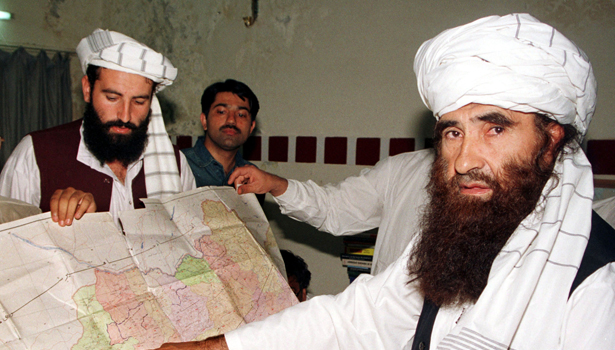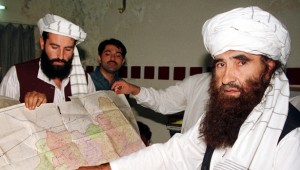
The U.S. Finally Blacklists an Afghan Terrorist Group

Jalaluddin Haqqani, then the Taliban’s Minister for Tribal Affairs, points to a map of Afghanistan in 2001 as son Naziruddin looks on. (Reuters)
This piece is cross-posted from Joshua Foust’s regular column in The Atlantic.
After years of holding off on officially designating the Haqqani Network as a terror organization, in the hopes of enticing them into a peace deal, the Obama administration closes the door.
Last week, the U.S. government added the Haqqani Network, a violent insurgent group operating in Afghanistan and Pakistan, to its official list of Foreign Terrorist Organizations. While some analysts have questioned the move, it is a smart decision that will pay serious dividends for U.S. security.
Blacklisting the Haqqani Network was long overdue, coming nearly a year after Admiral Mike Mullen told a Senate hearing that the group “acts as a veritable arm of Pakistan’s Inter-Services Intelligence Agency,” or ISI. At the time, only the organization’s top leadership was sanctioned through travel restrictions and arrest warrants.
The Haqqani Network is, by any definition of the word, a terrorist organization. U.S. officials accuse the Haqqani Network of perpetrating not only multiple violent acts against the U.S. and Afghan militaries, but terror attacks against civilians within Afghanistan. Their hallmark is the “spectacular attack”: big, high visibility, and against a target of symbolic importance (such as an embassy). The Haqqani Network has also attacked the 2007 Independence Day parade in Kabul, several hotels hosting foreign nationals, schools in eastern Afghanistan, clinics, hospitals, and government offices.
So why have some analysts questioned the move? Two scholars of the Taliban, Alex Strick van Linschoten and Felix Keuhn, argued in the New York Times that the listing is pointless:
The decisions we make today will shape and constrain our future policies. Between 2002 and 2004, for example, some senior Taliban leaders sought reconciliation and cooperation with the Afghan government and the international community. The negative responses they received left little room but to pursue the path of resistance. Likewise, listing the Haqqanis as an F.T.O. now will deter them from coming to the negotiating table. It will also be seen as a sign of American insincerity by the Taliban and thus play into the hands of those opposed to a conciliatory approach.
They cite several U.S. leaders suggesting that the Haqqani group might be open to reconciliation. Still, the idea that the Haqqanis might accept a political role in a future Afghanistan has been making the rounds for years.
At the same time, experience should inspire skepticism of a possible Haqqani reconciliation. While the mainstream Taliban has publicly expressed interest in a negotiated settlement with the Afghan government, the Haqqanis have not. Despite Secretary of State Hillary Clinton’s attempt last to reach out to the Haqqanis for talks, using the Pakistani government as an intermediary, those efforts failed.
Designating the entire Haqqani organization, and not just its senior leadership, as terrorists could carry a number of benefits. Most important, the designation limits Pakistan’s options for dealing with them openly. The Haqqanis operate in many respects like a big black market criminal enterprise; they get away with a lot of travel and illegal business activities because of the tacit tolerance they seem to enjoy in some quarters of the Pakistani government.
Pakistan’s support for the group is integral to their successful financing. Being put on the FTO blacklist allows the U.S. Treasury Department’s highly effective terrorist financing cell to target the organization. Additionally, listing one of the Pakistani government’s favorite terrorist groups gives the U.S. government additional leverage in its discussions with Islamabad over the future of Afghanistan.
Arguably, the biggest barrier to a negotiated settlement in Afghanistan is not the insurgency itself, but Pakistan. Islamabad has stood in the way of negotiation efforts it dislikes, and has declined to participate in other efforts that have targeted favored groups such as the Haqqanis. The FTO designation gives the U.S. more leverage for constraining Pakistan’s ability to support the terrorist group.
The FTO designation also shows how smart it was to develop the Northern Distribution Network, a supply network into Afghanistan. The opening of the NDN, which is a northern alternative to Pakistan’s vital supply lines for the war in Afghanistan, gave the U.S. the capacity to sit out Pakistan’s eight-month closure of the supply lines earlier this year. Islamabad can no longer hold those supply lines over Washington’s head, and in return Washington is applying additional pressure on Islamabad.
That’s not to say there aren’t downsides: van Linschoten and Keuhn might in fact be right that the Haqqanis are less likely to participate in a negotiated settlement inside Afghanistan. But that doesn’t mean the blacklist is a bad idea. The Haqqani Network has operated far more openly than other insurgent groups active in Afghanistan, to their great benefit and our great loss. It’s past time they feel the same financial, political, and social pressure the have other groups.





